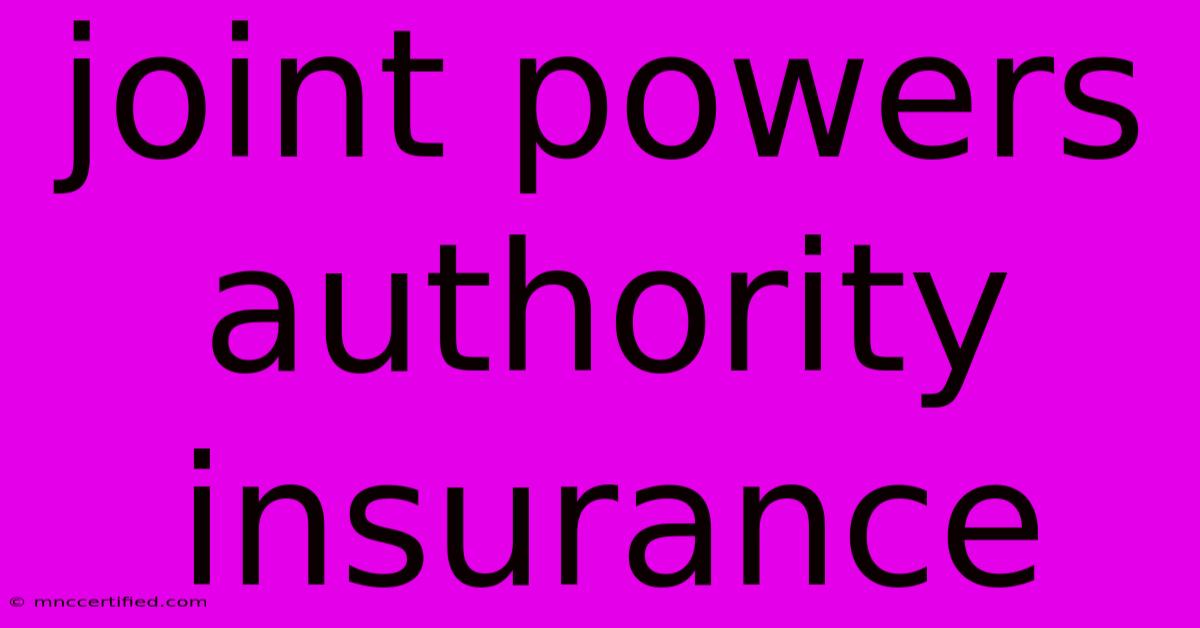Joint Powers Authority Insurance

Table of Contents
Joint Powers Authority (JPA) Insurance: A Comprehensive Guide
Joint Powers Authorities (JPAs) are increasingly common entities formed by public agencies to share resources and achieve common goals. However, the unique nature of a JPA necessitates a thorough understanding of its insurance needs. This comprehensive guide will delve into the intricacies of JPA insurance, exploring the types of coverage required, the challenges involved, and strategies for effective risk management.
Understanding the Risks Faced by Joint Powers Authorities
JPAs, while sharing resources, also share liability. This shared responsibility creates a complex risk landscape demanding specialized insurance solutions. The types of risks faced vary greatly depending on the JPA's activities, but common concerns include:
- General Liability: This covers bodily injury or property damage caused by JPA operations or employees. For instance, a JPA managing a park might face claims related to accidents on the premises.
- Professional Liability (Errors & Omissions): Crucial for JPAs providing professional services, this protects against claims arising from negligence or mistakes in professional judgment. A JPA offering planning services, for example, could be sued for errors in a development plan.
- Workers' Compensation: Mandatory in most jurisdictions, this covers medical expenses and lost wages for employees injured on the job. This is particularly important for JPAs employing staff across multiple participating agencies.
- Auto Liability: This covers damages caused by JPA-owned vehicles. Many JPAs utilize vehicles for inspections, maintenance, or transportation, necessitating robust auto liability coverage.
- Cyber Liability: In today's digital age, JPAs must safeguard sensitive data. Cyber liability insurance protects against data breaches and related financial losses. This is especially important if the JPA handles sensitive information like personnel records or financial transactions.
- Directors and Officers (D&O) Liability: This protects the JPA's board members and officers from personal liability for wrongful acts committed in their official capacities. This is vital in mitigating personal financial risk for individuals involved in the JPA's governance.
The Challenges of Securing JPA Insurance
Obtaining adequate insurance for a JPA presents unique challenges:
- Complexity of Risk Assessment: Accurately assessing the risk profile of a JPA often requires specialized expertise due to its multifaceted nature and the involvement of multiple agencies.
- Negotiating Coverage Across Multiple Entities: Reaching a consensus on insurance coverage among participating agencies can be time-consuming and complex.
- Finding Specialized Insurers: Not all insurance providers understand the nuances of JPA operations, making it crucial to find insurers with specific experience in this area.
- Cost Considerations: Balancing adequate coverage with budget constraints can be a significant challenge, particularly for JPAs with limited resources.
Strategies for Effective JPA Insurance Management
Effective JPA insurance management requires a proactive and strategic approach:
- Thorough Risk Assessment: A comprehensive risk assessment should be conducted regularly to identify potential liabilities and adjust coverage accordingly.
- Clearly Defined Agreements: A well-defined agreement between participating agencies outlining responsibilities and liability is essential for smooth insurance management.
- Selection of Experienced Insurance Broker: Engaging a broker specializing in public entity insurance is crucial for navigating the complexities of JPA insurance.
- Regular Policy Review: Policies should be reviewed annually to ensure they adequately address current risks and comply with evolving regulations.
- Risk Mitigation Strategies: Implementing proactive risk management strategies, such as robust safety protocols and employee training, can minimize potential claims and reduce insurance costs.
Finding the Right Insurance Provider for Your JPA
When searching for a JPA insurance provider, consider these factors:
- Experience with JPAs: Prior experience insuring similar organizations is crucial.
- Financial Strength and Stability: Choose insurers with a proven track record of financial soundness.
- Competitive Pricing: Obtain quotes from multiple insurers to ensure you are receiving competitive pricing.
- Responsive Customer Service: Effective communication and readily available support are essential for managing claims and policy updates.
By understanding the unique risks, challenges, and strategies related to JPA insurance, your authority can secure adequate coverage, manage risk effectively, and ensure the long-term success of its operations. Remember, a proactive approach to insurance is vital for protecting both the JPA and its member agencies.

Thank you for visiting our website wich cover about Joint Powers Authority Insurance. We hope the information provided has been useful to you. Feel free to contact us if you have any questions or need further assistance. See you next time and dont miss to bookmark.
Featured Posts
-
Car Insurance In Hammond Indiana
Nov 22, 2024
-
Celebs Millionaire Status Revealed
Nov 22, 2024
-
Sebanda Insurance Franchise Cost
Nov 22, 2024
-
Ground Beef Recall 160 000 Pounds
Nov 22, 2024
-
Strictlys Pete Love Triangle Confession
Nov 22, 2024